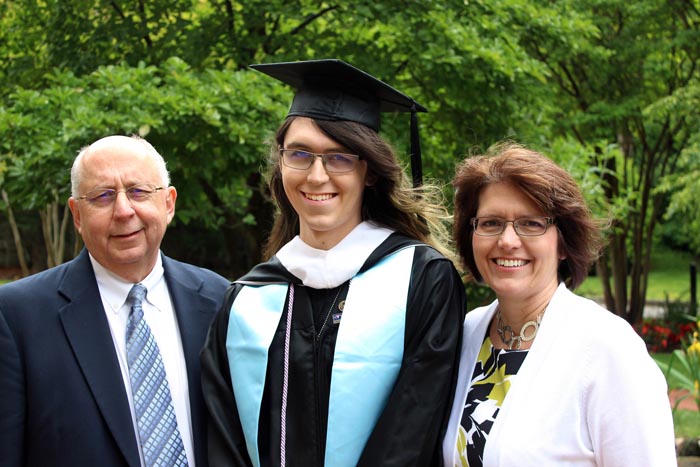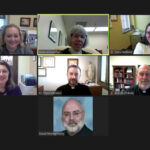
Deacon Ray and Laurie Dever of the Diocese of St. Petersburg, Florida, celebrate with Lexi, their eldest child, on her graduation day at Georgetown University in 2016.
By Barb Arland-Fye
The Catholic Messenger
(Editor’s Note: This is a second article in a series on A Pastoral Approach to Gender.)
After their eldest child, then a college freshman told Deacon Ray and Laurie Dever that she was transgender they depended on prayer, their faith, love of family and each other for guidance. “As parents, we wanted to discern what was best for our child, and hopefully what was best for our family, our marriage and our Church,” Deacon Ray told The Catholic Messenger during an interview this fall.
The Devers, parents of three daughters ages 27, 25 and 23, live in the Diocese of St. Petersburg, Florida, and previously spoke via Zoom video conference with the Gender Committee of the Diocese of Davenport. The committee formed about a year ago to learn more about gender issues, specifically transgenderism, a topic receiving scrutiny in education, sports, work places and the public square. Following their Zoom video conference, the Devers agreed to talk with the Messenger to put a human face on this issue.
“Transgender” is an umbrella term for individuals whose gender identity, gender expression or behavior does not conform to that typically associated with their sex at birth, according to the American Psychological Association. An estimated 1.4 million to 1.65 million U.S. adults identify as transgender, according to the Williams Institute at UCLA School of Law, or about .6% to .7% of the population.
Signs of struggles
Lexi grew up as a boy in the Dever family, attended Catholic schools from preschool through college, including an all-boys Jesuit high school, and was an altar server. Lexi also attended homecoming and prom. Those events “often triggered depression incidents, and with the benefit of hindsight, we can see why,” Deacon Ray said. “She was representing as a male and acting as a male, but that was not who she really was.” The facade of a seemingly typical childhood simmered to crisis proportions, manifested in life-threatening mental health challenges.
“She had some (suicide) attempts in high school and college. She thought of jumping off a bridge twice in her life,” once in high school and once in college, Laurie said. One time she found Lexi sleeping on the floor in her bedroom with red Sharpie marker “all over her body as if she wanted to kill herself.”
The summer after her freshman year at Georgetown University, Lexi went through gender dysphoria therapy and psychological counseling. Gender dysphoria refers to clinically significant distress or impairment related to a strong desire to be of another gender, which may include a desire to change primary and/or secondary sex characteristics (The Diagnostic and Statistical Manual of Mental Disorders, Fifth Edition, DSM-5).
Lexi’s therapy eventually led the Devers to understand that she would need to transition from male to female. “We had been dealing with mental health issues but it started to come out over a period of time that her gender identity crisis was the underlying cause,” Deacon Ray said.
Later, as a senior at Georgetown University, Lexi wrote about the deep self-loathing she experienced because of her gender crisis. “Back in high school, I tried to kill myself twice in one week. I tried to kill myself because I knew I was an abomination,” she wrote in a 2015 article for “The Hoya,” Georgetown’s student newspaper. “I barely made it out of high school alive.”

Deacon Ray and Laurie Dever are pictured with their daughters on vacation earlier this summer.
Prayerful reflection
The Devers believe the discernment and training for the diaconate that had taken place a few years earlier allowed them to “give it over to God to understand where we need to take this. I prayed for openness, to understand, to educate myself and to ask, ‘what does this mean from both a physiological and spiritual aspect,’” Deacon Ray said. It was about coming to terms with what “God was trying to help us learn.”
When Lexi called her mother about a life-changing decision, “I wasn’t in the mindset to grasp what she was telling me,” said Laurie, who was out of town with another daughter at the time. Lexi “shared that she was going to transgender. I said, ‘Ok, let me talk to Dad about this …’ It was kind of difficult for me at first, for both of us. We wanted to ask the questions, ‘why and how do we reconcile this with our Catholic faith’ … as every Catholic parent would.”
Deacon Ray wondered about God’s plan in this unique situation — a deacon with a child coming out as transgender — an issue the Catholic Church has not addressed specifically in the Catechism (but did address in a 2019 document on education). “We first needed to take care of our child and then deal with the diaconate. It took a while to come to that in prayerful reflection,” Deacon Ray said.
Georgetown University proved to be a godsend for Lexi. “Georgetown and many Catholic colleges are supportive and accepting of LGBTQ (lesbian, gay, bisexual, transgender, queer or questioning) students and helped her tremendously,” Deacon Ray said. In the article that Lexi wrote for The Hoya titled “The Georgetown that saved me,” she said:“A phone call from my RA was the only thing that stopped me from jumping off the Key Bridge during my freshman year. I was still an atrocity. I was still a freak. Then I started to talk to people. Not everyone, I realized, saw my wayward desires as a problem. There was even a full-fledged transgender student on campus. The queer community at Georgetown opened my eyes to a world where I could exist and not hate myself.”
Longing for acceptance
Transgenderism “is a life or death issue for so many of these kids,” Deacon Ray said. “They know they need to come out to live authentically but they are afraid that if they do they will lose their families, their friends, all that they have known. They are afraid of rejection by families.” Laurie said one of Lexi’s friends at Georgetown who was transgender, “who guided and advised her, was basically disowned by her parents when she came out.”
The Devers did not reject Lexi. “We all had to go through our process in our unique ways. Going through therapy to understand,” Laurie said. “We had to mourn the loss of a son and gain the blessings of a daughter. It’s a matter of just loving a child.” Lexi’s younger sisters are fiercely supportive of her, their parents said.
“If anything, it has grown our faith in that it has been an eye-opening experience. We are all called to see those on the margins and reach out to the margins and include them. That was the central message of Jesus,” Deacon Ray said. “Sometimes our eyes are closed to the people on the margins. Going through this experience has helped us open our eyes more — to people on the edges of society in one way or another. It has grown our faith in a good way.”
“It has removed the scales from my eyes,” Laurie said. People who are transgender “want to be loved by God as we all do. Many want to continue their faith journey but don’t feel accepted.” The violence against them is real, Deacon Ray said. On its website, the Human Rights Campaign reported, “Sadly, 2021 has already seen at least 50 transgender or gender non-conforming people fatally shot or killed by other violent means. We say at least because too often these stories go unreported — or misreported” (https://tinyurl.com/ vussxvyh).
“Have I told you yet that the average lifespan of a transgender person is 31 years?” Lexi wrote in the piece for The Hoya. “If I am ‘average,’ I will be dead within a decade. Let that sink in for a second. There’s a reason I’m not thinking about marriage, children or even long-term career plans. I don’t want to plan for a life I probably will not get to live.” Despite that grim outlook, Lexi today is doing well, with a career in graphic arts, her parents said. She has stepped away from the Catholic Church, however, because she does not feel welcome.
“People think it’s a choice,” Laurie said, “but in reality, God made them the way they are.” Evidence exists, Deacon Ray said, “that there is more to human beings and human sexuality than is incorporated into that Christian anthropology we believe in. It’s good, but it needs to grow. It isn’t just male and female he created them. They (LGBTQ) are God’s creation, too.”












I say this as someone who has a disability since birth: Repent and believe in the Gospel.
Yes it is true that we should be welcoming and love our same sex attracted friends/family and those with gender dysphoria. It is a terrible cross to bear. The Church and myself have yet to master this and many other needs.
Having said that, when someone is disordered, like myself, we shouldn’t be telling them that the disorder is them. No matter how much they relate to it, they are more than their disability. Furthermore, God did not make us broken. He allowed it to occur for us to get closer to Him. Through our pain, we will grow closee to God. If we choose too.
We should also not pretend disorders are “acceptable.” They are disorders for a reason. Something is not right, or out of order. It may be “liveable” or even “advantageous” but No-one should want these disorders or to live as if they are “acceptable.”
I wonder how much bullying, lack of empathy, guidance, and true masculinity led to this child’s “transition.”
I feel as though the family is hostage to this new “phenomenon.” As if they are being led into hell trying to save their son/brother. The child has left the one true Church. The kids are jn “full support” and the parents are possibly entertaining heresy, just to show they care.
I predict if a gentle reminder isn’t given to everyone, this family will he lost and the son will sink further. I will pray for them. Please join me in doing so.
Tony, I rarely comment on these things – but this is a gentle reminder to you that you are not God.
No matter what you think, you can never tell God what to do. God loves and cherishes Lexi exactly as she is.
I just wanted to make sure and let Deacon Ray and Laurie Deve know that I SO appreciate them. You are the light that is shining in this darkness of hate. Thank you. I pray that one day, the Catholic church will follow in your footsteps of love, research, listening, and thoughtfulness. I see Jesus’ care for his sheep in what you do.
Until then, many of us will continue to have to stay away from your buildings due to the immense amount of mental anguish we from being judged. Thank you for giving me hope.
I have learned that they are not disorders, but different orders, different strengths, given to us for the good of the whole.
The Church and society will someday be open headed and open hearted enough to realize they were wrong about this, too.
I will pray for you, Toni B, and you should pray for yourself. Yours is not a Christian response. Jesus said, “Love one another as I have loved you,” and he loved all kinds of people.
This is not a “phenomenon”; it is an awakening—just as there had to be awakenings in the Church for the realities of atrocities against indigenous people in Canada, against pregnant girls in Ireland, against gay people across the world, against children among some of our priests. This institution professes love for the poor and the marginalized, yet has to constantly be browbeat by an evolving society into the realization that God’s children are NOT only those that the Church deems “acceptable.” They are all of us.
The love of a transgender child is not heresy—it is love, pure and simple. Jesus would’ve walked with Lexi and her (yes, HER) brethren 2,000 years ago while the crowds jeered and the Pharisees muttered. Lexi’s bullies didn’t lead her to transition; it almost led her to suicide. To the destruction of life. But love saved her.
Enough of this tripe about “disorder.” Such a cold, cruel, narrow-minded word! Lexi is no more disordered than the lepers of Christ’s time, or the physically and mentally challenged who were once scorned by society but finally began being embraced decades ago, or the left-handed kids smacked by the nuns of days gone by because they didn’t write “the right way.” Now, God’s LGBTQ children are starting to be embraced as well, while so many people in the Church fret and dither and “discern.” The answer is right in front of all of us. Love one another. Period.
Hi Tony, I’m confused by your comment. You mention the son in this family, when there are only daughters.
Also, if you think that people being transgender is new/counter to church teachings, I recommend you look up Saint Marinos, who despite being assigned female at birth led out his life as a man, and is canonized in the church. And he lived over 1000 years ago.
Thank you Tony, well said. There has to be careful attention to those experiencing this, but as you also note, we are called to be Christlike, that is, to testify to the truth. There cannot be “A is not A” or “2+2=5”. For salvation, we must not lie to ourselves to make us feel good in this world.
Tony B, I will pray for you.
This is a very misleading article and it is concerning that it has been published in this way by a Catholic publication. An article like this inevitably arouses sympathy and compassion, but compassion is not always properly expressed by conceding to the wishes of somebody undergoing a deep psychological if not psychiatric trial. It is definitely not the case when it results in a Catholic – and a deacon no less – acting in contradiction to the Catholic faith.
The Holy Word of God declares “Male and female He created them” (Gen 5:2). It is more than alarming to hear a Catholic deacon declare “It isn’t just male and female he created them.”
I truly sympathise with gender-identity traumas of “Lexi” and the effect on his wider family. Many families have addressed this in a variety of ways. It is regrettable that a periodical identifying as “Catholic” is not showing how Catholics can, in truth and with love, address the difficulties that such a situation presents.
I think your comment has merit. The fact a deacon sees his child leave the church should be-a sign. And yes who knows the influences that occurred over time.
Seems time the question is : given church doctrine about sex n gender is true ( the consistent nature of teaching vs the impossible task of re doing this doctrine
How then can the deacon return to his vocation in the church?
Hard hard task of giving to God what is his
Ref the above comment. Although I’m Catholic and believe for me it’s the true church, were all fed in different ways. As for broken, we’re all broken, some more so than others. I don’t pretend to understand the difference between transgender, gay, etc Al, only that they’re human, they deserve love and to be loved and completed. And further, as my beloved friend Father Brian said, God don’t make NO junk. Follow Jesus and don’t judge.
There are people (maybe 1% of the population or more) who have dissociated alter parts of their identities. This is called Dissociative Identity Disorder (DID) and occurs because of trauma. These people can be suicidal too. In one person, the alters can be male or female, different ethnicities and different ages. Do we allow a 60 year old with DID to enroll in grade school when she identifies as a child? I have deep sympathy for all people with psychological and spiritual disorders. But how far into reality denial are we willing to go here?
Have compassion for these people, love them unconditionally, but seek healing for them as well. Christ is the Divine Physician. Pray. Fast on bread and water. Have Masses said. If possible, have the son go to Confession weekly or monthly, receive the Eucharist in a state of grace on Sundays and Holy Days of Obligation and receive an anointing of the sick once a month. Pray the Rosary daily. Pray the Auxillium Christianorum prayers daily. Contact an orthodox Catholic psychotherapist, like Raymond Lloyd Richmond, Ph.D. in San Fransisco. He has a great website, A Guide to Psychology and It’s Practice and a helpful section on Identity and Loneliness. He has a second great website, Chastity in San Francisco. These disorders can be healed or greatly improved through long-term psychotherapy and a lifelong commitment to the spiritual disciplines of the Catholic faith. Don’t give up! God is with you!
Toni B. I am so sorry that you consider yourself “disordered”. Please don’t apply the lack of compassion that you have for yourself darken the way you see others who are “ different” than you. May God bestow peace on your heart and in your soul..
Bravo to Deacon Ray for not giving up on or trying to change Lexi. I can relate both to Deacon Ray and Lexi, for I am a transgender Catholic deacon in the independent Catholic Apostolic Church in North America (CACINA). Yesterday (12/19/21) I preached the homily in my home parish in which I clearly spelled out how I reconcile being a transgender Catholic, based solely on the Holy Bible. A video of the Mass is on Facebook.com/SaintWTransmission.
Further, this past summer CACINA launched its Saint Wilgefortis TransMISSION, an online spiritual home for transgender Catholics. At CACINA, we believe that God created transgender people as the beautiful people they are, that He loves them just as they are, and that they are welcome to full communion with God’s Holy Church.
Thank you for this article. As an educator, I am encountering students like Lexi. They are nice, kind, sensitive, yet conflicted. I have decided to love them, to be kind to them and to protect them from anyone who would bully them.
I feel equally ill at ease when debates (or worse, verbal fighting) are held to see which side is “right” on sexual ethics.
No one side is “perfectly” Christian, while the other is “to be loved” but (implicitly) “pitied”.
The more I think of it, LGBTQ are not an ultimate goal in life, nor an absolute “creation” of God. But then, neither is heterosexuality, in the sense that man and woman are supposed to be joined in a couple, since the Catholic Church values (rightly or wrongly is another matter) continence! Just try that to a traditional Chinese family, and you will see!
What really matters is where is that leading you to on God’s path, and with others.
A Catholic publication cannot say this: “Lexi’s therapy eventually led the Devers to understand that she would need to transition from male to female.”
Christ’s purpose on this earth was was to testify to the truth. The jumble above clearly is in opposition to telling the truth. Will the Diocese of Davenport clarify the Catholic position on this matter and correct the untruths here?
Prayers are offered up for the male born child , siblings and parents that God may shine His grace on them. That the Holy Spirit will guide them and help them in the continued loving of all their children.
Joe
The Diocese of Davenport has shown itself to be brave and compassionate in listening to our transgender brothers and sisters and their stories that show us a new pathway to grace. The Holy Spirit is speaking to us; let us listen with open hearts. Thank you, Catholic Messenger!
Walt Heyer
Rene Jax
James Shupe
This is a far more complicated issue than one story or one family.
Judge not lest ye be judged does not apply only to those you choose but it applies to you too!
This is a sentiment that seems lost on the “woke” among our society.